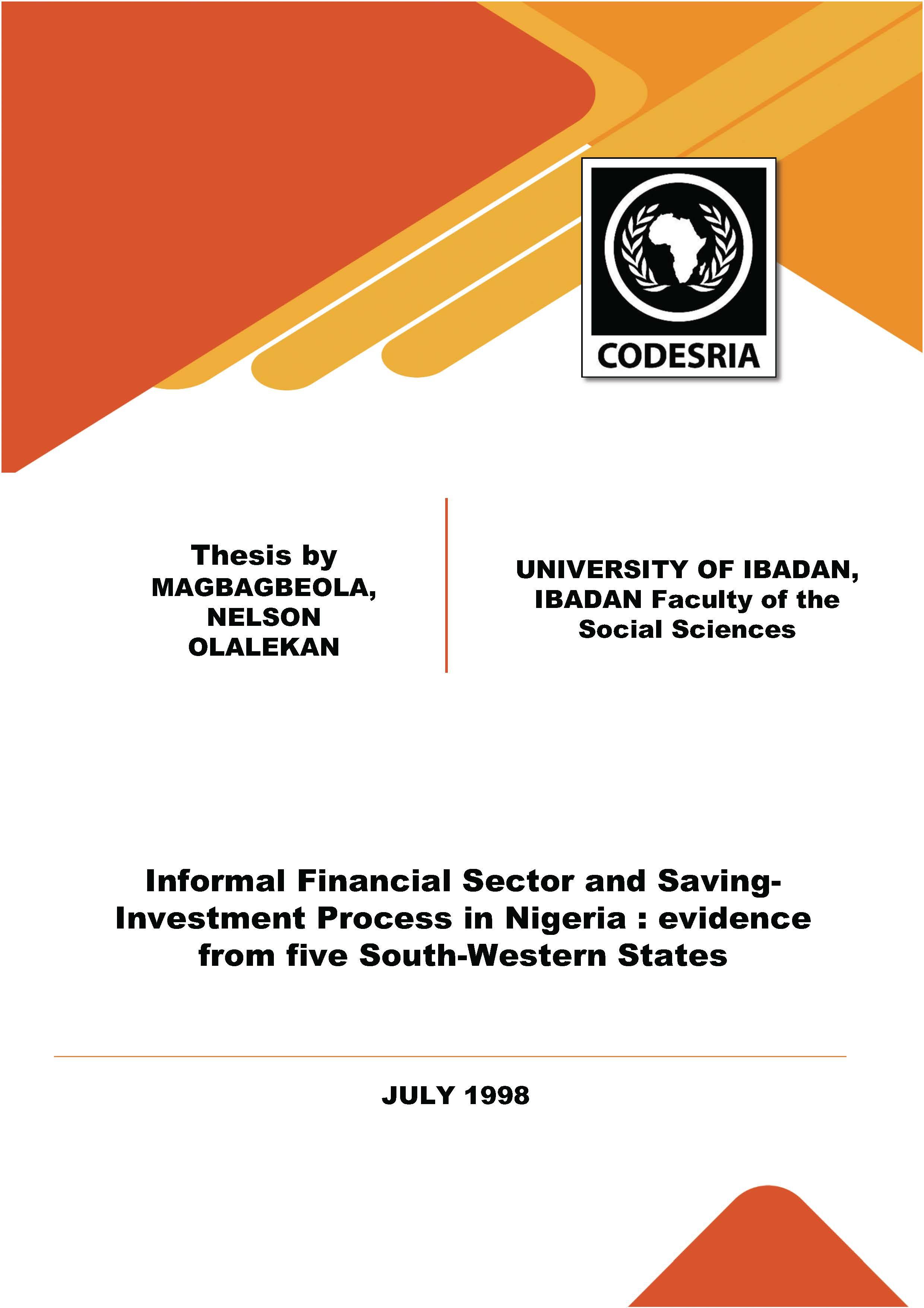Informal Financial Sector and Saving-Investment Process in Nigeria : evidence from five South-Western States
Mots-clés :
Institutions financières, des économies, secteur informel, investissement, systèmes bancaires, marché financier, secteur financier informel, intermédiation financière, finance informelle, NigeriaSynopsis
Cette thèse présente une étude empirique du secteur financier informel dans l'ancien Nigeria occidental dans le cadre théorique du paradigme de l'information imparfaite. Il estime la taille relative du secteur financier informel au Nigéria en examinant certains agrégats monétaires. Les résultats de l'estimation montrent qu'en termes monétaires, le secteur financier informel représente un tiers de la taille de son homologue formel. L'un des domaines dans lesquels cette thèse étend la frontière des connaissances sur la finance informelle au Nigéria est l'utilisation du modèle de choix qualitatif ( modèle logit) pour examiner le rôle du secteur financier informel dans la mobilisation et l'allocation des ressources nationales pour la formation de capital au Nigeria. Nigeria. AutreLes tests utilisés comprennent les tests statistiques sommaires généraux pour examiner les caractéristiques de quatre agents financiers informels particuliers (les collecteurs de l'esusu, les ROSCA, les prêteurs et le grand public), déterminer la procédure et les canaux d'intermédiation financière informelle et analyser les liens entre l'informel et le formel. institutions financières. Les résultats de l'étude représentent une contribution importante à la littérature sur la finance informelle au Nigeria ainsi qu'une contribution, d'une grande pertinence politique,
vers un développement intégré des institutions financières formelles et informelles au Nigeria.
Téléchargements
Références
Adams, D.W. (1992) "Taking a Fresh Look at Informal Finance" In Adams, D.W. and D.A. Fitchett (eds) Informal Finance in Low-:!ncdme Countries. San Francisco, CA: Westview Press.
Adams, D.W. and D.A. Fitchett, eds. (1992) Informal Finance in Low-Income Countries. San Francisco, CA: Westview Press.
Adams, D.W. and V. Sandoval (1989) "Informal Finance in the Phillipines", Economics and Sociology Occasional P.aper, No. 1570. Department of' Agricultural Economics and Rural Sociology. Columbus, Ohio: Ohio State University.
Adams, D.W., Graham,D., and J.D. Von Pischke; eds. (,1984) Undermining Rural Development with Cheap Credit (Boulder: Westview Press).
Adegboye, R.0. (1969) "Procuring Loans by Pledging Cocoa Trees", Journal of the Geographical Association of Nigeria, 12.
Adera, A. (1995) "Instituting Effective Linkages Between the Formal and the Informal Financial Sectors in Africa: A Proposal'' Savings and Development Vol. XIX, No. 1
African Development Bank (ADB) (1995) "Domestic Resource Mobilisation" in African Development Report 1995, Abidjan: Cote d'Ivoire, Chapter 11 .
Ahmed, A.H. (1975) Private money-lenders,in the Sudan Gezira Scheme, Department of Rural Economy, University of Khartoum, Sudan.
Ajakaiye, D.O. and W.0. Akerele (1995) "Overview of Conceptual and Methodological Issues In Informal Sector Research", a paper presented at the CBN/NISER Workshop on Conceptual and Methodological Issues in the Informal Financial Sector Research, 30th - 31st August.
Amani, H.K.R., L.A. Msambichaka, M. Lundahl and S. Hedlund (1987) "Agricultural Credit in Tanzania - a Peasant's Perspective" Savings and Development 11 (4)·, pp. 379-400
Ardener, S. (1964) "The Comparative Study of Rotating Credit Associations", The Journal of the Royal Anthropoligica/ Institute of Great Britain and Ireland 94: 201-229.
Aredo, D. (1993) The Informal and Semi-Formal Financial Sectors in Ethiopia: A Study of the lqqub, Jddir and Savings and Credit Cooperatives. AERC Research Paper 21, Nairobi.
Aryeetey, E. and M. Hyuha (1991) "The Informal Financial Sector and Markets in Africa: An Empirical Study". In: Economic Reform in Sub-Saharan Africa. Ajay Chibber and Stanley Fischer,eds. The World Bank, pp. 125-136.






